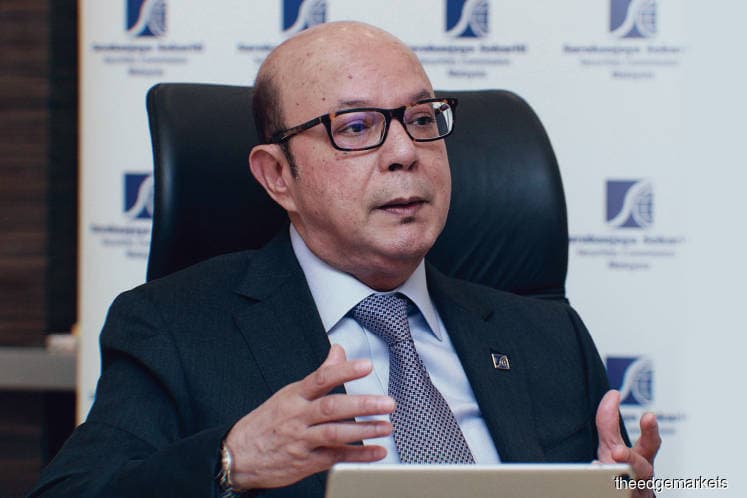
This article first appeared in The Edge Malaysia Weekly on March 18, 2019 - March 24, 2019
SECURITIES Commission Malaysia chairman Datuk Syed Zaid Albar talks about the local stock exchange, criticism of surveillance inconsistencies and the way forward for the Islamic capital market
The Edge: On T+2, while it strengthens competitiveness in the marketplace and improves operational efficiency, certain quarters are of the view that contra players and market participants might switch to margin trading. Overall, does the SC think the Malaysian market is headed in a healthier direction with T+2?
Datuk Syed Zaid Albar: The SC and Bursa Malaysia must decide in favour of policies that result in a net gain to the overall capital market. Convergence with the T+2 settlement cycle is an important step in enhancing our market’s operational efficiency and competitiveness as it will bring us in line with market practices in Asia-Pacific, including key Asean markets such as Singapore, Thailand and Indonesia.
At present, almost all contra positions are closed within the same trading day. Contra trading also accounts for a relatively small part of overall market activities, and is mostly within the retail segment, averaging less than 18% of total retail trading volume in the last four years.
Multiple factors influence contra position-taking, such as expectations on individual stock or sector performance and developments in the domestic and global markets, which are not necessarily affected by the settlement time frame. Retail investors are free to choose their preferred trading and funding strategies, and margin financing is already permitted under the existing framework.
The SC is sometimes criticised as inconsistent in its decisions. For example, some cases are handled with settlements while others go all the way to the court. Please comment.
The Capital Markets and Services Act 2007 vests the SC with the power to take three types of enforcement action: administrative, civil and criminal. In selecting the enforcement route for a specific case, there is a broad range of factors to consider. The decision on the option taken depends on the strength and availability of the evidence, gravity of the offence and the amount of profit or loss made.
The SC has internal processes that allow deliberation and decision on the appropriate route to take for a given case. We also consider the precedents set by our previous enforcement actions but we recognise where the facts of a case require it to be distinguished. At the end of the day, we pursue an enforcement strategy that yields the most efficient and effective outcome for each case.
The Islamic finance and capital market is significant in Malaysia but relatively small globally. What is the strategy to help expand the ecosystem?
While Malaysia is currently the global leader in the Islamic capital market, it is important for us to continue driving the expansion of this space. We are currently focusing on harnessing the synergy between the Islamic capital market and sustainable and responsible investment (SRI) strategies, which can help us reach out to the growing number of SRI investors and attract a wider investor base, including institutional funds from major economies such as the US, Europe and Japan.
Through this strategy, we are looking to position Malaysia’s Islamic capital market as the hub for both conventional and shariah-compliant investors seeking SRI and ethical investment.
Digitisation plays an equally important role here (as it does in the conventional space) in attracting new investors and businesses to the capital market. Through platforms such as equity crowdfunding, we hope to provide a new generation of investors with the opportunity to participate in the growth of emerging companies.
Based on a study by Pew Research Centre, the global Muslim population is projected to reach 2.2 billion by 2030, making them an increasingly influential consumer base. Also, the size of the global halal economy, comprising businesses that provide goods and services that are in line with the requirements of Islam, was expected to grow to US$6.4 trillion last year. Malaysia’s Islamic capital market can be a natural fit in terms of providing financing to these businesses, paving the way for end-to-end shariah compliance.
Given that most regulators around the world have taken a wait-and-see approach to regulating digital assets and initial coin offerings, why has the SC decided to push on with the proposed regulatory framework?
The SC sees practical use cases for digital assets in the capital market. For example, fundraising for early-stage businesses or projects through the issuance of new digital tokens, potential markets for secondary trading of digital assets and so on.
In line with the global trend, we are seeing increasing activity in the digital asset space. At present, we recognise that there are insufficient investor protection measures and transparency of information in place for this asset class.
From conversations with our peer regulators around the world, we believe that the conversation on digital assets has turned towards having some form of regulations in place. We have engaged with regulators that have implemented regulations to learn from their experience so that we can formulate an appropriate approach to our market.
With our regulatory framework, the SC ensures that investors are protected and at the same time, it harnesses the potential these digital assets and the underlying technology can bring to the financial market.
Save by subscribing to us for your print and/or digital copy.
P/S: The Edge is also available on Apple's AppStore and Androids' Google Play.